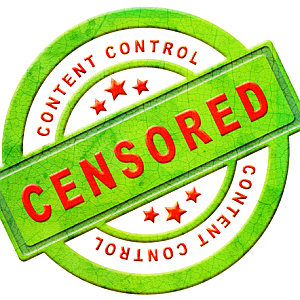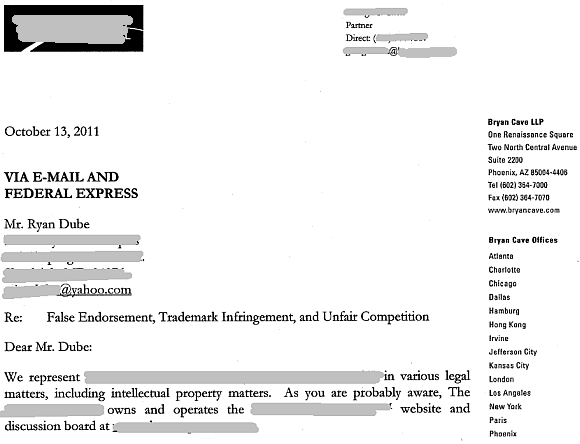In any free, democratic society, citizens take pride in the fact that they have free access to information. This is true in many countries, where citizens have won hard-fought battles for independence. It is something that is sacred here in the U.S. where I live. However, the idea that the Internet is completely free - a wide-open source of all sides of any argument - is actually a farce.
The concept is noble, and lots of young geeks during the early days of the Internet, celebrated the birth of this "Information Super Highway". It was a new world, where anyone could publish their thoughts and opinions on any matter, and get heard by everyone in the world. The Internet was supposed to blow open barriers and tear down walls.
For the most part at the beginning, it did. However, through the years, there have been more and more elements of censorship slowly creeping into the mix. Everyone is under the impression that the Internet offers free, bi-directional access to information, but whether it's at work, school, home, or at the library - there is someone seeking to block what you are able to see when you search the Internet for information.
How The Internet Gets Censored
It's no secret that I write a whole lot about the Great Firewall of China, and love seeing articles here at MUO like Justin's tips on checking if your website is blocked in China, or reviews of apps like ChinaChannel to expose censorship there.
But really, is it just China? Can we really say that we experience a truly open Internet? If we did, then why would we need articles like Chris' article on how people can access blocked websites, and James' article on how to outsmart the Pirate Bay block?
In this article, I'm going to cover the four ways that your access to the Internet can be censored, and who is doing the censoring.
Lawyers Control Who Stays Online
There is a little-known activity going on out there on the Internet, and ultimately it's an activity that is affecting what information you get to learn about when you search the web.
A while back, I received one of my first legal threats. If you run a website long enough and if you cover somewhat controversial topics, you're bound to get one. Eventually, no matter now much evidence you accumulate and no matter how factual you keep your articles - someone, somewhere, will take issue with something you've written or with your website in general.
In my situation, I was rather shocked to learn that someone would take such an approach - sending out a legal threat rather than just directly emailing me to discuss the issue. I'm a very friendly guy and nine times out of ten I may alter opinion-pieces I've written if someone can show that the evidence collected is invalid.
However, along with the ranks of other people that consider themselves to be information freedom-fighters, removing any information from the Internet isn't something I take very lightly. However, there is a general feeling among small website owners out there that legal threats lead to expensive lawsuits meant to "destroy" the little guy.
Using these threats, larger companies will pay $50 to $100 to have these legal letters sent out - letters that amount to nothing less than outright corporate bullying - forcing information to be removed from the Internet when it reflect poorly upon the company or the person in question. In this way, corporations use lawyers to censor the Internet.
The National Firewall
It is an unfortunate situation that not everyone in the world can access the same websites as everyone else. Yes, there are governments that block access to websites that the government itself deems as "inappropriate" for its citizens.
I have always focused primarily on China when I've written about Internet censorship, because the firewall works so blatantly against websites and blogs that feature content that is negative toward the Communist government - particularly if those sites are created by the Chinese themselves.
Curious what other countries censor the Internet for their citizens, I referenced Wikipedia, Techdirt and the Guardian. All three agree that the following ten countries are the worst offenders when it comes to censoring information on the Internet. (1) (2) (3)
1. China
2. Iran
3. United Arab Emirates
3. Saudi Arabia
4. Burma (Myanmar)
5. Bahrain
6. Vietnam
7. Yemen
8. Syria
9. Sudan
10. Uzbekistan
Not too many surprises there. It may also be no surprise that the United States, Germany, Canada, Australia, the United Kingdom - to name a few - have no evidence of government Internet censorship.
However, it was surprising to me to learn that India has evidence of selective filtering in four categories, Italy and South Korea have selective social filtering, and Mexico has selective "conflict/security" filtering.
School & Work Censorship
I think it's fairly obvious how writers at MUO feel about Internet censorship. We've offered articles on how to bypass firewalls at school or work, or how to unblock specific web pages from behind a strong firewall.
But, who gets to decide what websites are "inappropriate" at school or at work? Obviously, firewall administrators do their best to prevent employees or students from wasting time on the Internet, but at my last job, I was shocked to discover during my lunchtime news reading, that a left-wing activist's website had been blocked and listed as a "hate" site.
I also discovered that a site with views no more extreme than Rush Limbaugh had been blocked as an "extremist" site.
These filter rules really appeared to apply more to the personal beliefs of the firewall administrator than to the desire to keep employees from "wasting time". Then again, if you are using someone else's network bandwidth, then you have to be willing to accept that they are going to censor that private bandwidth however they see fit.
Will Your ISP Censor the Internet?
I saved this form of censorship for last because it is the latest underhanded effort that corporations are using to take control of the Internet.
Unfortunately, Internet Service Providers like Verizon or Comcast want to start giving preferential bandwidth treatment (for faster loading), to certain websites that pay the Internet provider for that privilege.
In the United States, the FCC has been fighting diligently to prevent such back-handed censorship of the Internet from taking place. The FCC has been defending its rules in court to fight for "Net Neutrality", which requires Internet bandwidth providers to treat all Internet traffic equally - regardless of where that traffic is going to or coming from.
However, companies like Verizon think that they have "editorial discretion" to allow some content while blocking other content. In other words, they could make it so that website owners that pay them get more exposure for their content than you can, if you can't afford to pay for equal bandwidth. It amounts to censorship of the poor.
The FCC argues that ISPs are not editors - they are conduits just like electricity or phone service providers. (4)
It seems that while citizens in countries like China and Iran have to deal with heavy-handed censorship of the Internet by the government, citizens in supposedly "free" capitalistic countries may be facing an even greater threat than censorship by the government -- censorship by the corporations that control access to that Internet.
As you can tell, freedom of access to information is an important issue for all of us here at MUO, and I'm sure you have your own opinion on the matter. We'd love to hear it. What is censorship like where you live and where you work? Share your thoughts in the comments section below (if you're allowed to, that is).
References: Techdirt, Guardian, Wikipedia, Save The Internet [Broken URL Removed]
Image Credits: Jose Gil / Shutterstock.com, Censored Via Shutterstock, Film Reel Via Shutterstock, Escape From Glass Via Shutterstock Censored Via Shutterstock





